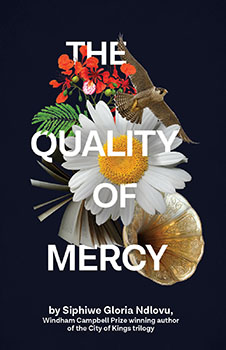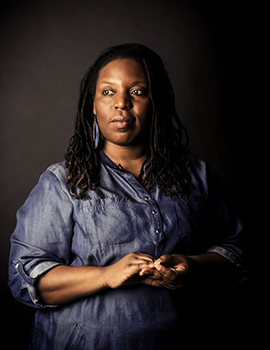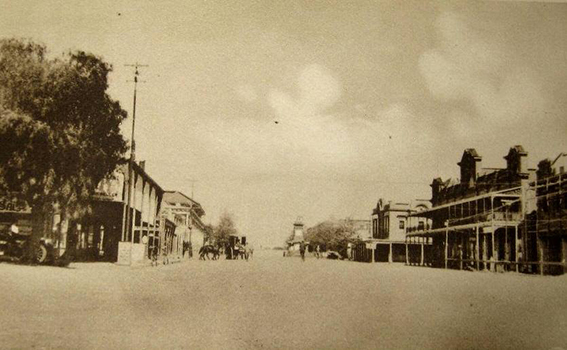

Features International Thrills: Siphiwe Ndlovu
Africa Scene: Untangling the Web of Colonialism…and Murder
The Big Thrill Interviews Siphiwe Ndlovu
 Siphiwe Ndlovu is a writer, filmmaker and academic who holds a PhD in Modern Thought and Literature from Stanford University, as well as master’s degrees in African Studies and Film from Ohio University. She was born in Bulawayo, Zimbabwe. Her first novel, The Theory of Flight won the Barry Ronge Fiction Prize in South Africa. In 2022, Ndlovu was awarded a Windham-Campbell Prize for Fiction. In 2023, her story The Postman in the Yale Review, based on a character in THE QUALITY OF MERCY, was a finalist for the American Society of Magazine Editors Award.
Siphiwe Ndlovu is a writer, filmmaker and academic who holds a PhD in Modern Thought and Literature from Stanford University, as well as master’s degrees in African Studies and Film from Ohio University. She was born in Bulawayo, Zimbabwe. Her first novel, The Theory of Flight won the Barry Ronge Fiction Prize in South Africa. In 2022, Ndlovu was awarded a Windham-Campbell Prize for Fiction. In 2023, her story The Postman in the Yale Review, based on a character in THE QUALITY OF MERCY, was a finalist for the American Society of Magazine Editors Award.
THE QUALITY OF MERCY is a most unusual book and hard to pigeonhole. At one level it’s a gripping mystery, but it has aspects that are more usually associated with literary fiction. Here you will find characters to remember. It was my choice of one of five top recent southern African mysteries.
On the eve of his country’s independence, Spokes Moloi investigates his first “white case” and finds a very confusing crime scene. Having recently been promoted to chief inspector, it’s up to Spokes to solve long-standing mysteries. His task now is to unravel the alleged murder of a man, Emil Coetzee, but also the tangled web that his life created.
Would you start off by telling us a bit about yourself and what drew you to become a novelist?
I think I was just born curious, and, lucky for me, I had an active imagination. From a very young age I could endlessly entertain myself with stories of my own invention, but my grandmother was an amazing oral storyteller, and I tended to love her stories best of all because worlds that I couldn’t have imagined before came alive in her words. We had a modest but well-stocked library at home, and my grandmother always encouraged us to read. My entire childhood was so surrounded by stories at every turn that when I started to write my own stories in my teens it just seemed like second nature to me. But even so, I always thought I would be a psychologist. When I was applying for college I realized for the first time that I could major in Creative Writing…and that’s all she wrote.
THE QUALITY OF MERCY is the third book in your City of Kings series. You have deliberately divorced your novels from the real Zimbabwe, yet the setting and history is very similar. Why did you choose to write in a fictional location?
The location isn’t fictional; it is just unnamed. The details of the setting very much speak to the fact that the stories take place in the City of Kings, which is a moniker for Zimbabwe’s second largest city. You are correct in saying that I deliberately do not mention Zimbabwe by name throughout the trilogy. There are several reasons for this, which I have stated elsewhere. Here I will mention that I love the sense of mystery that is created by not naming the country. Not only does the reader have to find “clues” to try to determine where the stories are set, but they also, hopefully, start reflecting on the similarities and differences between the setting and the place where they live. Zimbabwe, like any other country, has been shaped by global events. My hope is that the reader then sees and makes the connection between their experiences and those that are taking place in the stories.
Spokes M. Moloi is an appealing detective. Our introduction to him is as a young man back from fighting “for the British in a war that was none of his business” expecting promised rewards that never materialize. He falls in love with a headman’s daughter, and her father sets him a mystery puzzle to solve overnight. He does so, but the twist is unusual and so is the outcome. You say this is based on a folk story. Was it this combination of abiding love and ability to solve mysteries that suggested Spokes to you as a protagonist?
The story, especially as it appears in the Prologue, is based on a story that my grandmother told me. As I have mentioned, my grandmother was a phenomenal storyteller. While she did tell her fair share of folktales, she was also very inventive and often made up stories to teach us moral lessons. When she told me the story about the policeman who falls in love with a headman’s daughter and follows her all the way to her village, for years I thought she was actually retelling something that had happened. I am still not sure whether she made it up or not. In the story she told me the man was already a policeman and was already in love and so the “combination of abiding love and ability to solve mysteries” really was already extant in the story I received from my grandmother. I began writing the novel with a clear vision of the protagonist, which is a great gift to have as a writer.
Thirty years later, Spokes has had a successful career in the police and is a chief inspector. A ceasefire has been declared between the minority white government and the freedom fighters. Did you choose this period to put your characters under the tension of a dramatic change?
Yes, setting the story during the five months of transition as Rhodesia becomes Zimbabwe was very deliberate. THE QUALITY OF MERCY is, as you say, the third novel in the City of Kings trilogy, but really, chronologically, in terms of plot, it is the middle book. The Theory of Flight deals with the postcolonial period and The History of Man deals with the colonial period, THE QUALITY OF MERCY is very concerned with the period of transition as a state moves from being colonial to being postcolonial. How will the characters deal with the world as they know it changing? What will change and what will remain the same? Will there be clear victors and clear losers, or, will the characters all lose and gain some things along the way?
Much of the story involves the strange disappearance of Emil Coetzee, the head of the Organization of Domestic Affairs, a powerful arm of the white government, who one day apparently walks off into the bush alone, unarmed, and disappears. Although his character is drawn through his interactions with others and their fear of him, he seems to be an allegory for the whole concept of the white government’s rule by force. Did you intend us to see it that way?
The character of Emil Coetzee appears in all three novels and serves a different function in each novel. In The Theory of Flight, he is a pivotal character who plays a very minor role, but symbolizes and exemplifies a very particular kind of power. In The History of Man, he is the protagonist and through him and the portrayal of his life we see the limits of the colonial narrative and enterprise. In THE QUALITY OF MERCY, his disappearance acts as an allegory for the “end” of the colonial state. He is feared, loved, revered, loathed—there is no shared consensus regarding what people feel for him—and this is apt because not everyone had the same relationship to the colonial state.
The Secret Intelligence Unit sees Coetzee’s disappearance as an opportunity to put their own spin on the event. The unit’s boss, Coetzee’s friend Rutherford, has one approach, but his subordinate, Maraire, twists it his own way. Is this the start of the levers of power changing hands without much change to their outcomes?
Yes, most definitely. The characters of Rutherford and Maraire depict how some things that seem like change are actually a continuation of the same. Racially, Maraire’s advancement up the ranks may seem like progress, but his reasoning is just as problematic as Rutherford’s, so nothing much will change. Real change will have to come from elsewhere.
Once Spokes is called in to investigate Coetzee’s disappearance, the case becomes complex, linking to other issues and other murders. Spokes has to balance the case from political as well as factual viewpoints, and he does so with skill and compassion. Is this the key to his character?
Spokes is brilliant at deductive reasoning, but that is not the only thing that makes him the great investigator that he is; as Rutherford and Maraire come to learn. Spokes wears a fedora, rides a bicycle and calls his superiors “Sir.” To Rutherford and Maraire he is a relic of history—an old-fashioned detective from Hollywood’s Golden Age or the pages of an Agatha Christie novel—and, therefore, not worth their time.
What they do not see because their own depth is very superficial is that the very qualities that they see as throwbacks and throwaways are the very qualities that make him an exceptional detective: his bravery, his integrity, his abundance of emotional intelligence. Here is a man whom history could have hardened the way it hardened them; here is a man who chose to hold on to himself instead. Spokes M. Moloi understands and knows himself, which is what allows him to have compassion and empathy, which in turn, allows him to see beyond the surface of things and to seek justice no matter the cost.
Are you working on another book, and if so, would you tell us a little about it?
Yes, I am working on a fourth book. It is an inverted Gothic novel with a mystery at its heart.
You can find out more about Siphiwe and her book here.
International Thrills: Siphiwe Ndlovu
- International Thrills: Fiona Snyckers - April 25, 2024
- International Thrills: Femi Kayode - March 29, 2024
- International Thrills: Shubnum Khan - February 22, 2024



